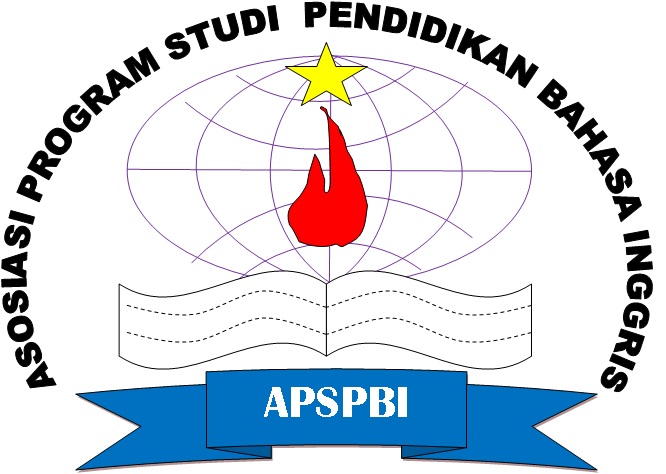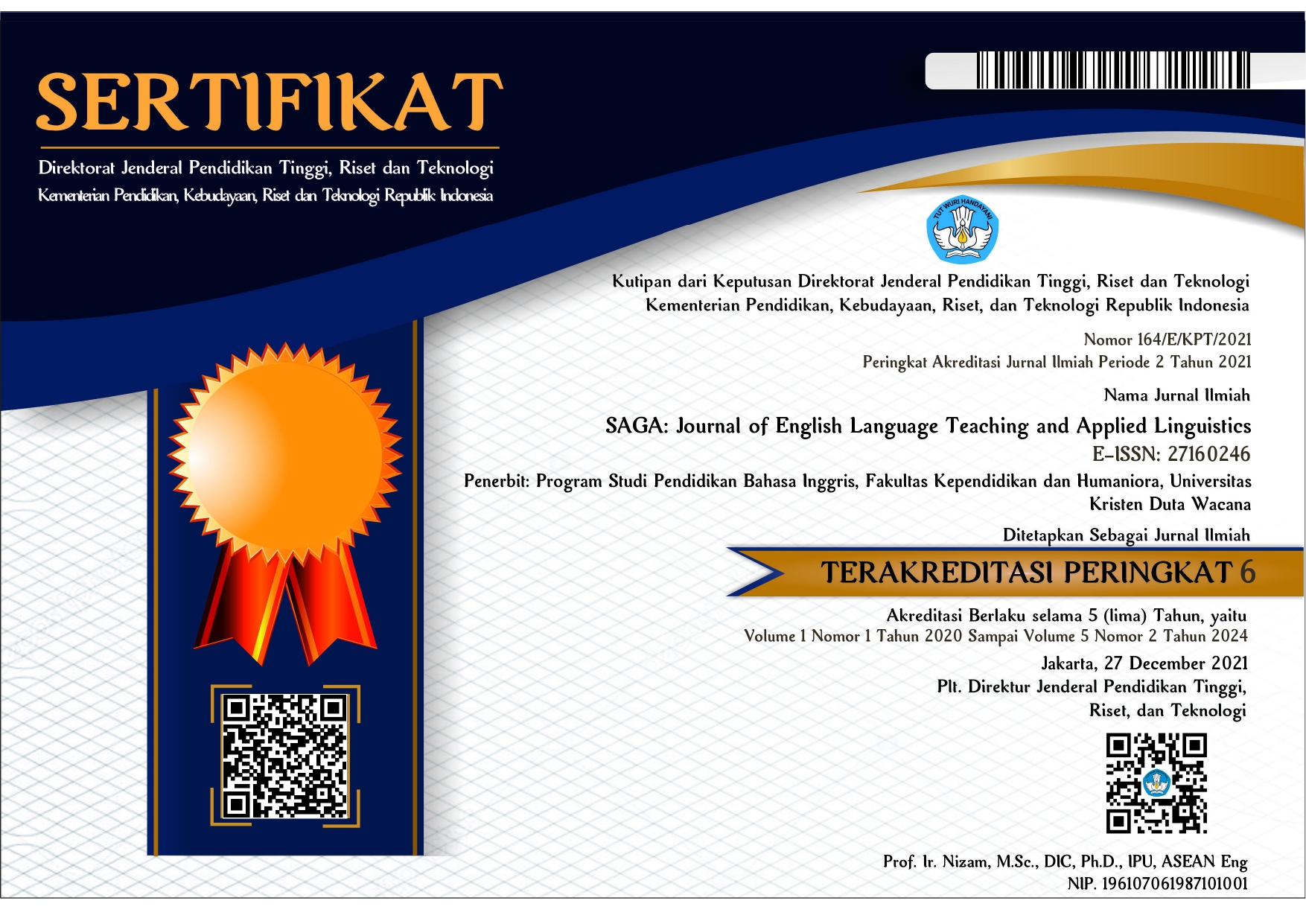Undergraduate Students’ Perceptions toward Self-Assessments
DOI:
https://doi.org/10.21460/saga.2022.32.129Keywords:
Assessment, self-assessments, students’ perceptions, self-evaluationAbstract
In the current education context that encourages students to be independent learners, self-assessments have gained more attention as one of the effective ways to support self-learning. However, teachers in Indonesia seem hesitant to use self-assessments because they assume that students cannot understand and perform self-assessments. Therefore, the research is aimed to know about undergraduate students' perceptions toward self-assessments, which can result in knowing students' comprehension of self-assessments. The research was conducted at an English Language Education Program (ELEP) from one of the private universities in Central Java, which involved 42 students from the 2018 academic year who had passed Teaching Skills Courses (Teaching English for Young Learners, Teaching English for Adult Learners, and Teaching English for Specific Purposes). A questionnaire consisting of close-ended and open-ended questions was used to collect the data, and the data were analyzed using statistical analysis and content analysis methods. From the results, it was found that the participants reacted positively toward self-assessments. The participants felt content and helped when doing self-assessments, and they also knew the benefits and the importance of it. Furthermore, it was found that they were able to carry out self-assessments appropriately and showed their preference for self-assessments, such as comparing with criteria or making reflections. Therefore, it can be concluded that the teachers' previous assumptions can be considered inaccurate. The study is hoped to help teachers consider implementing self-assessments more in their courses and help them design suitable self-assessments.
References
Andrade, H. (2019). A critical review of research on student self-assessment. Frontiers in Education, 4(87). https://doi.org/10.3389/feduc.2019.00087.
Baleghizadeh, S., & Masoun, A. (2013). The effect of self-assessment on EFL learners’ self-efficacy. TESL Canada Journal, 31(1), 42-58.
Brantmeier, C., Vanderplank, R., & Strube, M. (2012). What about me? Individual self-assessment by skill and level of language instruction. System, 40(1), 144-160. https://doi.org/10.1016/j.system.2012.01.003.
Brown, G., Andrade, H., & Chen, F. (2015). Accuracy in student self-assessment: Directions and cautions for research. Assessment in Education Principles Policy and Practice, 22(4), 444-457. https://doi.org/10.1080/0969594X.2014.996523.
Brown, G., & Harris, L. R. (2014). The future of self-assessment in classroom practice: Reframing self-assessment as a core competency. Frontline Learning Research, 2(1), 22-30. https://doi,org/10.14786/flr.v2i1.24.
Butler, R. (2011). Are positive illusions about academic competence always adaptive, under all circumstances: New results and future directions. International Journal of Educational Research. 50(4), 251-256. Retrieved February 17, 2021, from https://doi.org/10.1016/j.ijer.2011.08.006.
Desjarlais, M., & Smith, P. (2011). A comparative analysis of reflection and self-assessment. International Journal of Process Education, 3(1), 3-18.
Fahimi, Z., & Rahimi, A. (2015). On the impact of self-assessment practice on writing skill. Procedia - Social and Behavioral Sciences, 192, 730-736. https://doi.org/10.1016/j.sbspro.2015.06.082.
McMillan, J. H., & Hearn, J. (2008). Student self-assessment: The key to stronger student motivation and higher achievement. Educational Horizons, 87(1), 40-49.
Muñoz, A., & Álvarez, M.E. (2007). Students' objectivity and perception of self-assessment in an EFL Classroom. The Journal of Asia TEFL, 4(2), 1-25.
Panadero, E. & Alonso-Tapia, J. (2014). Self-assessment: Theoretical and practical connotations. When it happens, how is it acquired and what to do to develop it in our students? Electronic Journal of Research in Educational Psychology, 11(2), 551-576. https://doi.org/10.14204/ejrep.30.12200.
Panadero, E., & Romero, M. (2014). To rubric or not to rubric? The effects of self-assessment on self-regulation, performance and self-efficacy. Assessment in Education: Principles, Policy & Practice, 21(2), 133-148. https://doi.org/10.1080/0969594X.2013.877872.
Perry, F. L. (2011). Research in applied linguistics: Becoming a discerning consumer (2nd ed.). Routledge.
Punhagui, G. C., & Souza, N. A. (2013). Self-regulation in the learning process: Actions through self-assessment activities with Brazilian students. International Education Studies, 6(10), 47-62. https://doi.org/10.5539/ies.v6n10p47.
Rahayu, N. K. A., Paramartha, A. A. G. Y., & Dewi, N. L. P. E. S. (2021). The implementation of authentic assessment in English instruction. Jurnal Penelitian dan Pengembangan Pendidikan, 5(1), 122-128.
Ratminingsih, N., Marhaeni, A. & Vigayanti, L. P. D. (2018). Self-assessment: The effect on students’ independence and writing competence. International Journal of Instruction. 11(3), 277-290. https://doi.org/10.12973/iji.2018.11320a.
Rolheiser, C., & Ross, J. (2013). Student self-evaluation: What research says and what practice shows. Plain Talk about Kids, 43–57.
Ross, J. A. (2006). The reliability, validity, and utility of self-assessment. Practical Assessment, Research and Evaluation, 11(10), 1-13.
Shatri, Z. G., & Zabeli, N. (2018). Perceptions of students and teachers about the forms and student self-assessment activities in the classroom during the formative assessment. Journal of Social Studies Education Research, 9(2), 28-46.
Wang, W. (2016). Using rubrics in student self-assessment: student perceptions in the English as a foreign language writing context. Assessment & Evaluation in Higher Education, 42(8), 1-13. http://dx.doi.org/10.1080/02602938.2016.1261993.
Wicaksono, V. D., Budiyono, & Supriyono. (2020). Reflective journal development as self-assessment. Journal Education and Technology, 4(2), 147-153. https://doi.org/10.29062/edu.v4i2.114.
Wisnu, C., & Pradana, S. A. (2020). Students’ self-assessment in article writing class. English Education: Jurnal Tadris Bahasa Inggris, 13(1), 15-31.
















